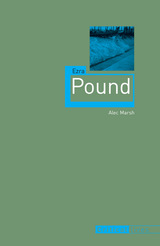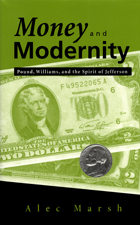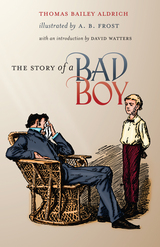2 books about Marsh, Alec

Ezra Pound
Alec Marsh
Reaktion Books, 2011
Genius, Confucian, fascist, traitor, peace activist—Ezra Pound—love him or hate him, he is impossible to ignore as one of the most influential modernists and controversial poets of the twentieth century. His life, as Alec Marsh makes clear in this biography, raises vital questions for anyone interested in politics, art, and poetry.
No writer of his stature promoted so many acquaintances who would go on to become such distinguished names in their own right—James Joyce, T. S. Eliot, and Ford Madox Ford were among the many who benefited from Pound’s enthusiasm and editorial suggestions. And without Pound’s generosity to his fellow writers, literary modernism might not have happened, or have been the significant, influential movement that it became. Yet by 1925, Pound himself was living in obscurity in Italy, having trouble publishing his own work. There he became a Mussolini enthusiast and was eventually indicted for treason by the United States before being judged mentally incompetent to stand trial.
Marsh takes us inside these years in an attempt to uncover what happened. How did such a great modern artist succomb to such views? Was he a traitor? And was he, in fact, insane? Analyzing Pound’s prose and poetry as well as his magnum opus, The Cantos, Marsh provides clear insights into Pound’s work as well as a coherent account of his troubled life that will be essential reading for students and fans of modernist literature.
[more]

Money and Modernity
Pound, Williams, and the Spirit of Jefferson
Alec Marsh
University of Alabama Press, 1998
Marsh locates Pound and Williams firmly in the Jeffersonian tradition and examines their epic poems as manifestations of a Jeffersonian ideology in modernist terms.
The modernist poets William Carlos Williams and Ezra Pound were latter-day Jeffersonians whose politics and poetry were strongly marked by the populism of the late 19th century. They were sharply aware of the social contradictions of modernization and were committed to a highly politicized, often polemical poetry that criticized finance capitalism and its institutions--notably banks--in the strongest terms.
Providing a history of the aesthetics of Jeffersonianism and its collision with modernism in the works of Pound and Williams, Alec Marsh traces "the money question" from the republican period through the 1940s. Marsh can thus read two modernist epics--Pound's Cantos and Williams's Paterson--as the poets hoped they would be read, as attempts to break the hold of "false" financial values on the American imagination.
Marsh argues that Pound's and Williams's similar Jeffersonian outlooks were the direct result of the political battles of the 1890s concerning the meaning of money. Although Pound's interest in money and economics is well known, few people are aware that both poets were active in the Social Credit monetary-reform movement of the 1930s and 1940s, a movement shown by Marsh to have direct links to Jeffersonianism via American populism. Ultimately, the two poets took divergent paths, with Pound swerving toward Italian fascism (as exemplified in his Jefferson and/or Mussolini) and Williams becoming deeply influenced by the American pragmatism of John Dewey. Thus, Marsh concludes, Pound embraced the fascist version of state-capitalism whereas his old friend proclaimed a pragmatic openness to the new selves engendered by corporate capitalism.
Money and Modernity exemplifies the best of recent literary criticism in its incorporation of American studies and cultural studies approaches to bring new insight to modern masterworks.
[more]
READERS
Browse our collection.
PUBLISHERS
See BiblioVault's publisher services.
STUDENT SERVICES
Files for college accessibility offices.
UChicago Accessibility Resources
home | accessibility | search | about | contact us
BiblioVault ® 2001 - 2024
The University of Chicago Press









